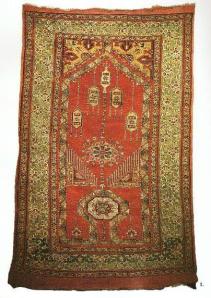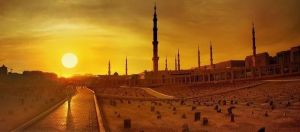In the name of Allah, the Most Beneficent, the Merciful.
“Verily, Allah and His angels confer blessings on the Prophet. O you who believe! Invoke blessings on him, and greet him with goodly salutations.” (Qur’an 33:56)
** PLEASE RECITE DUROOD ONCE BEFORE READING**
“In the annals of history, never was a man named ‘Muhammad’ before our dearest and beloved Prophet Muhammad (peace and blessing be upon him). He was given this name by his grandfather, Abdul Muttalib. The name Muhammad means, ‘One who is praised again and again’.”
Shaykh Muhammed Saleem Dhorat (Hafidhahu Allah), Islamic Da’wah Academy, Leicester, UK.
Allah (may He be glorified and exalted) has given many different commands in the Qur’an, such as prayer (Salah), fasting, pilgrimage (Hajj) etc.
He has also described and praised many noble Prophets and greatly honoured them.
After creating Sayyiduna Adam (peace & blessings be upon him), He (may He be glorified and exalted) ordered the angels to prostrate to him. However, nowhere has Allah stated in any command or in any act of honouring, that He is also a participant and that the believers should follow suit.
This honour is solely for the Leader of the creation, the Pride of the world (peace & blessings be upon him), where Allah attributes the act of conferring blessings Himself, and after attributing it towards His angels, finally orders the believers that they too should also invoke blessings upon him.
What virtue could be greater than the believers participating in this act with Allah and His angels?
Those who understand Arabic know that the verse begins with the particle ‘inna’ which adds great emphasis to its meaning, and the imperfect tense, ‘mudari’ has been used, which indicates continuity. In other words, it is firmly established that Allah (may He be glorified and exalted) and His angels are constantly conferring blessings upon the Noble Prophet (peace & blessings be upon him).
The author of ‘Ruh al-Bayan’ (may Allah have mercy upon him) writes, “Some scholars state that the meaning of Allah conferring His blessings is raising the Noble Prophet (peace & blessings be upon him) to the Praised Station (Al-Maqam al-Mahmood), which is the station of intercession.”
The blessings of (salat) of the angels are to pray for the Noble Prophet’s (peace & blessings be upon him) status to be elevated and to seek forgiveness for the Noble Prophet’s (peace & blessings be upon him) followers.
The meaning of the believers invoking blessings, is to follow the Noble Prophet (peace & blessings be upon him), love him, and to mention and praise his sublime qualities.
Moreover, this honour which Allah granted the Noble Prophet (peace & blessings be upon him) is far greater than the respect shown to Sayiduna Adam (peace & blessings be upon him) by ordering the angels to prostrate before him, because Allah is personally engaged in this act of honouring the Noble Prophet (peace & blessings be upon him), whereas only the angels were ordered to prostrate before Sayyiduna Adam (peace & blessings be upon him).
Sayyiduna Abu Hurayrah (Allah be pleased with him) narrates that the Messenger of Allah (peace & blessings be upon him) said,“Whoever invokes one blessing upon me, Allah will confer ten blessings upon him.” [Muslim & Abu Dawood]
One blessing and mercy from Allah is sufficient for the whole creation, let alone ten of Allah’s blessings in return for invoking blessings once!
How fortunate are those pious elders whose daily practice was to invoke blessings and peace 125,000 times! Just as we read regarding some of the pious elders of the family of Shaykhul Hadith Hadhrat Mawlana Muhammad Zakariyya Khandelwi (Allah illuminate his grave).
What virtue for invoking blessings is there which is greater than being granted ten blessings for invoking once?
It is narrated in ‘Al-Targhib’ on the authority of Sayyiduna ‘Abdullah ibn ‘Amr (Allah be pleased with him) that, ‘Whoever invokes one blessing upon the Noble Prophet (peace & blessings be upon him), Allah and His angels confer 70 blessings upon him.’
(N.B. One should understand at this point that if different rewards are mentioned for a certain action, as in this case where ten rewards are promised in one Hadith and seventy in another, some scholars are of the opinion that because Allah’s favours on the Ummah of Muhammad (peace & blessings be upon him) are increased on a daily basis, the narrations which mention greater reward are the latter Hadiths. Thus it is as though Allah initially promised ten rewards and then increased this to 70. Other scholars have interpreted this difference, with respect to different people, times and conditions. Similarly as discussed, on the reward of congregational prayer being multiplied by 25 or 27 times).
With regards to this matter, another opinion is that of Mulla Ali Qari (Allah illuminate his grave), who writes that the reward of 70 may be particular to invoking blessings on Friday, as in another Hadith it is narrated that the reward for good actions increases seventy fold on a Friday.
Sayyiduna Anas (Allah be pleased with him) narrates that the Noble Prophet (peace & blessings be upon him) said, “The person in whose presence I am mentioned should invoke blessing upon me. Whoever invokes one blessing upon me, Allah confers ten blessings upon him.” In another narration, “Whoever invokes one blessing upon me; Allah confers ten blessings upon him, forgives ten of his sins and elevates his status tenfold thereby.” [Ahmad & Nasa’i]
Allamah Mundhiri (Allah illuminate his grave) has also narrated the same hadith in Al-Targhib on the authority of Sayyiduna Bara’ (Allah be pleased with him), with the addition that the invoker receives the reward of freeing ten slaves.
Sayyiduna ‘Abdullah ibn Mas’ud (Allah be pleased with him) narrates that the Messenger of Allah (peace & blessings be upon him) said,“Indeed the closest person to me on the Day of Judgement is he who invokes blessings upon me abundantly.” [Tirmidhi]
Hafidh Ibn Hajar (Allah illuminate his grave) states in the commentary of the above Hadith that whoever recites Durood 300 times daily, will attain the honour of being closest to the Prophet (SAW) on the Day of Judgement.
Allamah Sakhawi (Allah illuminate his grave) narrates the same from Qut al-Qulub. Respected Mawlana Rashid Ahmad Gangohi (Allah sanctify his secret) would instruct his disciples to invoke blessings on the Prophet (SAW) at least 300 times. He, (RH), would say, “The favour of the Noble Messenger of Allah (peace and blessing be upon him) is immense. It is then truly an act of disloyalty that a person be miserly in invoking blessings upon him.”
Sayyiduna Abu Hurayrah (Allah be pleased with him) narrates that the messenger of Allah (peace & blessings be upon him) said,“Whoever invokes blessings upon me near my grave, I hear his blessings, and whoever invokes blessings upon me from a distance, they are conveyed to me.” [Bayhaqi & Mishkat]
Sayyiduna Abu Bakr al-Siddeeq (Allah be pleased with him) used to say, “Invoking blessings on the Prophet (peace & blessings be upon him) extinguishes sins more than cold water extinguishes fire and sending peace on him is better than freeing slaves.”
Love for Allah’s Messenger (peace & blessings be upon him) is better than the blood which flows in one’s body (as life in this temporary world depends on the blood in one’s body, whereas the eternal life of the Hereafter is doomed if one does not possess love for the Prophet SAW).
In another narration, love for Allah’s Messenger (peace & blessings be upon him) is better than fighting in Allah’s path.
When Hasan al-Basri (Allah illuminate his grave) used to discuss the crying of the date tree-trunk, he used to cry and say, “O slaves of Allah! A piece of dry wood cries out of longing for Allah’s Messenger (peace & blessings be upon him); you are more worthy of longing to meet him.” [Manifestations of Prophet Muhammad SAW’s beauty]
Shaykh Zakariyra RH had hundreds of disciples across the globe, many of them would write to Shaykh addressing their problems. A common reply he would give:
‘Har Dard Ki Dawa – – – Salle Ala Muhammad’ (Sallallaho Alayhi Wasallam).
The remedy for every problem is in sending salutations upon the Prophet (peace & blessings be upon him).
Sayyiduna Ka’b ibn Ujrah (Allah be pleased with him) says, “The Messenger of Allah (peace & blessings be upon him) once said,‘Come close to the pulpit, and so we came close. When he ascended the first step, he recited, ‘Ameen’. He then ascended the second step and recited, ‘Ameen’. He then ascended the third step and recited, ‘Ameen’. After he came down [after the sermon], we recited, ‘O Messenger of Allah (peace and blessing be upon him), we heard you say something today which we have never heard you say before.’ He SAW said, Jibreel came to me and said, ‘May that person be destroyed who witnesses the month of Ramadhan but is not forgiven.’ I said ‘Ameen’. When I ascended the second step, he said, ‘May that person be destroyed in whose presence you are mentioned but does not invoke blessings upon you’. I said, ‘Ameen’. When I ascended the third step, Jibreel said, ‘May that person be destroyed who finds both or one of his parents in old age, but they do not enter him into Paradise.’ I said, ‘Ameen’.” [Bukhari]
Not much elaboration is needed here – Sayyiduna Jibreel (AS) said three curses and the Noble Prophet (peace & blessings be upon him) said ‘Ameen’ upon all three curses. Firstly, the curse of an angel as great as Sayyiduna Jibreel (AS) was sufficient itself, and the intensity the curse gained through the Noble Prophet’s ﷺ ‘Ameen’ is quite evident.
Please see below PDF version of forty duroods:
http://www.inter-islam.org/DuroodSalaam/ArabicSalat-Salam.html
Ismail ibn Nazir Satia (In dire need of Allah’s forgiveness, mercy and pleasure).
7 Rabi’ul Thani 1436
O Allah! Have mercy on us and write our death in Medinah – The City of Your Beloved Sallallahu Alayhi Wasallam Enable us to travel time and time again to Makkah and Medinah… Ameen Ya Rabb!
*The contents of this article have been condensed from the book “Fadhail Durood” by Shaykh Zakariyya RH – unless otherwise stated.




